2022 Scholars
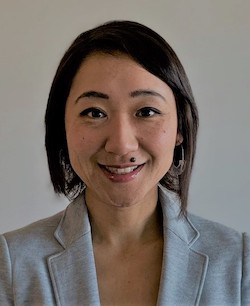
Yuka Asada, PhD, RD
Clinical Assistant Professor
School of Public Health at the University of Illinois Chicago (UIC)
Research Scientist
Institute for Health Research and Policy, UIC
Yuka Asada, PhD RD is a Clinical Assistant Professor in Community Health Sciences, School of Public Health at the University of Illinois Chicago (UIC) and Research Scientist at the Institute for Health Research and Policy, UIC. She is a Registered Dietitian with advanced training in qualitative methods and implementation science. Her research focuses on the equitable implementation of federal nutrition policies in school and childcare settings.

Gazi F. Azad, PhD
Assistant Professor
Columbia University Medical Center (CUMC)/New York State Psychiatric Institute (NYSPI)
Gazi F. Azad, Ph.D. is an Assistant Professor of Clinical Medical Psychology (in Psychiatry) in the Division of Child and Adolescent Psychiatry at Columbia University Medical Center (CUMC)/New York State Psychiatric Institute (NYSPI). She also is a licensed psychologist at the Center for Autism and the Developing Brain at New York Presbyterian Hospital (Columbia University Medical Center and Weill-Cornell Medicine). Azad is a Nationally Certified School Psychologist. Azad graduated with her B.A. in psychology from the University of California, Los Angeles, and received her Ph.D. in School Psychology from the University of California, Riverside. She completed her pre-doctoral internship at Columbia University. Her postdoctoral training was conducted in the Center for Mental Health at the University of Pennsylvania. Prior to joining the faculty at CUMC/NYSPI, Azad was an Assistant Professor in the Department of Mental Health at the Johns Hopkins School of Public Health, and a clinical psychologist in the Center for Autism and Related Disorders at the Kennedy Krieger Institute. Azad’s research focuses on using the principles of implementation science to optimize service delivery across systems of care. She is the developer of Partners in School, a multifaceted, multilevel implementation package for aligning evidence-based practices across home and school for children with autism spectrum disorder (ASD). Additional areas of expertise include community-partnered research and issues related to diversity, equity, and inclusion in service provision.
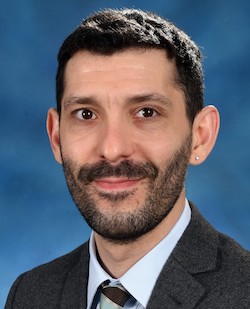
Jonathan Baghdadi, MD, PhD
Infectious Disease Physician
Hospital Epidemiologist
University of Maryland School of Medicine
Jonathan Baghdadi is an infectious disease physician and hospital epidemiologist at the University of Maryland School of Medicine. His research focuses on improving antibiotic use and reducing misdiagnosis through strategic implementation of molecular diagnostics for infectious diseases. He is currently supported by an institutional KL2 career development award to develop diagnostic stewardship interventions that can be embedded within the electronic health record. He completed medical school at NYU, residency at Washington University in St. Louis, and fellowship at UCLA, where he also completed a PhD in health policy and management.
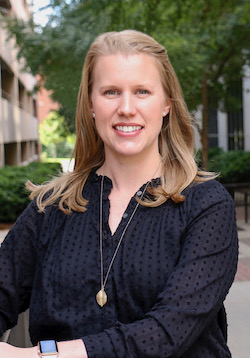
Kaylee Crockett, PhD
Assistant Professor
University of Alabama at Birmingham Heersink School of Medicine
Kaylee Crockett, PhD is a clinical health psychologist and Assistant Professor of Family and Community Medicine at the University of Alabama at Birmingham Heersink School of Medicine. Crockett's research broadly focuses on social stress and resilience factors among people with chronic illnesses, particularly HIV and its comorbidities. Crockett has a particular interest in the impact of stigma and discrimination in driving health inequities. Most of her research to date focuses on the consequences of societal stigma on health behavior and outcomes and the community contexts where these associations occur. Crockett is working to move this work forward to intervention adaptation and implementation with teams of healthcare providers and community members. Crockett's current work is funded by an NHLBI K23 award using mixed methods to investigate peer support as a tool for physical activity behavior in women with HIV and co-occurring hypertension.

Christina M. Cruz, MD, EdM
Assistant Professor
University of California, San Francisco
Christina M. Cruz, MD, EdM is a global mental health researcher and a practicing inpatient child and adolescent psychiatrist. Working at the intersection of psychiatry and education, she works to improve youth mental health care access globally as a physician-scientist by using available resources to create, test, and sustain alternative systems of care based in schools. At the heart of her research program is Tealeaf – Mansik Swastha (Teachers Leading the Frontlines – Mental Health; “Tealeaf”). In Tealeaf, situated in Darjeeling, India, trained and supervised teachers deliver task-shifted child mental health care to their students aged 5-12 years. In task-shifted care, the task of care delivery is shifted to trained and supervised non-professionals. Within Tealeaf, she created a new modality of therapy that only teachers can deliver, “education as mental health therapy” (Ed-MH). She created therapy techniques for Ed-MH that are evidence-based in mental health but also aligned with teaching processes and classroom behavior management. Teachers individually select techniques to deliver based on each students’ clinical needs. In contrast to care “doses” traditionally being number and length of 1:1 sessions, the Ed-MH “dose” in Tealeaf is each already occurring teacher-child interaction, now rooted in an Ed-MH technique. Tealeaf and Ed-MH findings have been published in Global Health Action, International Journal of Mental Health Systems, Global Public Health, Frontiers in Psychiatry, and Frontiers in Pediatrics. Cruz is an Assistant Professor in the Division of Child and Adolescent Psychiatry and the Associate Director of the Division of Global Mental Health in the Department of Psychiatry at the University of North Carolina at Chapel Hill School of Medicine, a Clinical Assistant Professor in School Psychology at the University of North Carolina at Chapel Hill School of Education, the PI and co-founder of the Global Child Mental Health Collaborative @ UNC, and is currently an institutional KL2 scholar at UNC. She completed her general psychiatry residency and child and adolescent psychiatry fellowship at UNC and medical school and education school at Harvard.

Najibah Galadanci, PhD, MPH
Postdoctoral Fellow
Division of Hematology, Department of Medicine, University of Alabama
Najibah Galadanci, PhD, MPH is currently a postdoctoral fellow at the Division of Hematology, Department of Medicine, University of Alabama at Birmingham after completing her PhD Epidemiology program at the UAB School of Public health, Birmingham. Prior to the PhD program, she has been working as a hematologist in Nigeria where she was dedicated to improving the overall care of children and adults with sickle cell disease (SCD). She also received her MPH degree at Vanderbilt University. Galadanci ‘s research is focused on evaluating the current practice of newborn screening (NBS) using a mixed model approach to evaluate surveillance and survival data in conjunction with understanding practice outcomes. The overall goal of the study is to use the sickle cell surveillance data to assess optimal practices in newborn screening for SCD. The study will move us one step closer to understanding the natural course of SCD and improve outcomes. Findings from this project will hopefully translate to a larger, R01 to implement novel methods of NBS practice and stroke screening for a more national representation of SCD centers in the United States.
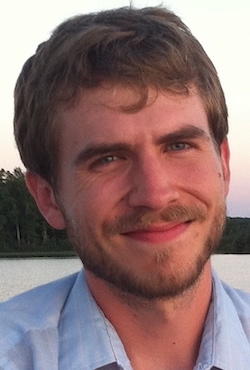
Daniel Grupe, PhD
Associate Scientist
Center for Healthy Minds at the University of Wisconsin-Madison
Daniel Grupe, Ph.D., is an Associate Scientist at the Center for Healthy Minds at the University of Wisconsin-Madison. His research investigates psychological and neurobiological mechanisms of stress-related mental health disorders, and the benefits of mindfulness interventions for promoting more resilient responses to stress and trauma. The primary focus of his current work is the intersection of contemplative science, mental health, and the criminal justice system. He has conducted federally funded research on the benefits of mindfulness training for law enforcement officers, and with academic and community collaborators is conducting stakeholder-informed research to address the unmet mental health needs of incarcerated individuals.
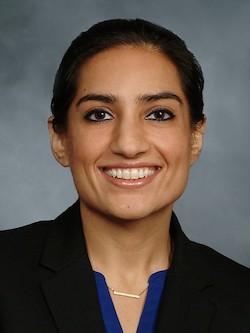
Gunisha Kaur, MD, MA
Assistant Professor
Weill Cornell Medicine
Medical Director Weill Cornell Center for Human Rights
Founding Director of the Human Rights Impact Lab
Stephen M. Kellen Term Member at the Council on Foreign Relations
Gunisha Kaur, MD, MA is a physician-scientist who has dedicated her career to advancing the health of forcibly displaced individuals such as refugees and asylum seekers. She has used her extensive background in neuroscience research as an analytical framework to study human rights through scientific methodology. Her research has been supported by several funders including the National Institutes of Health, the Foundation for Anesthesia Education and Research, and Cornell University.
Kaur's academic writing on forcibly displaced populations has been published by the highest impact medical journals including The New England Journal of Medicine and The Lancet. She has translated her medical and scientific expertise in mainstream outlets including TIME, CNN, and NBC News. Kaur has given over 100 national and international keynote presentations and talks, including with global leaders, at the United Nations, and for the U.S. Government.
Kaur is an Assistant Professor of Anesthesiology at Weill Cornell Medicine, a Medical Director of the Weill Cornell Center for Human Rights, Founding Director of the Human Rights Impact Lab, and a Stephen M. Kellen Term Member at the Council on Foreign Relations. She earned her B.S. from Cornell University in 2006, graduated from Weill Cornell Medical College in 2010, and completed her Anesthesiology Residency training at Weill Cornell Medical College/New York Presbyterian Hospital in 2014. She earned a Master's Degree in Medical Anthropology from Harvard University in 2015.

Grace J Kim, PhD
Assistant Professor
New York University
Grace J Kim, PhD is currently an assistant professor in the department of Occupational Therapy at New York University. Kim’s work encapsulates the intersection of technology, neurorehabilitation, and client-centered care. She is particularly interested in understanding how to leverage mobile technologies (ecological momentary assessments, sensor-based performance feedback, mobile phones) and shared decision-making approaches (motivational interviewing, metacognitive strategies) to maximize recovery as individuals transition back into the community. Kim is currently implementing a mixed methods feasibility study to examine the use of ecological momentary assessments and motivational interviewing to increase adherence to a 4-week self-initiated arm training program for stroke survivors living in the community.

Alan M. Rathbun, PhD, MPH
Assistant Professor
University of Maryland School of Medicine
Neuropsychiatric and Musculoskeletal epidemiologist
Alan M. Rathbun, PhD, MPH is a National Institute on Aging K awardee, Assistant Professor in the Departments of Epidemiology and Public Health and Medicine at the University of Maryland School of Medicine, and both a neuropsychiatric and musculoskeletal epidemiologist. Rathbun's research program is focused on understanding the interface of physical and mental health in chronic and acute musculoskeletal conditions, emphasizing between-condition symptomatic interactions, and interventions to the address physical and mental morbidity. Rathbun has more than a decade of experience designing and implementing epidemiologic investigations and possess significant expertise in epidemiological theory, research study design, and applied biostatistics.

Jennifer M. Reckrey, MD
Associate Professor
Icahn School of Medicine at Mount Sinai.
Jennifer M. Reckrey, MD is an Associate Professor at the Icahn School of Medicine at Mount Sinai. She completed her Family Medicine Residency at Montefiore in 2010 and her Geriatric Medicine Fellowship at Mount Sinai in 2012. Since completing her fellowship, she has cared for primarily older, frail people in their homes as part of the Mount Sinai Visiting Doctor’s program. While her initial job responsibilities were mostly clinical and administrative, the essential but often underappreciated role of caregivers in supporting the complex care needs of the homebound motivated her to pivot her career towards research. Her current research work examines how home-based models of clinical and long-term care support people with dementia and other serious illnesses living in the community. In particular, she is interested in the role of paid caregivers (e.g., home health aides, personal care attendants, and other home care workers) in the home-based dementia care team and how the care they provide matters for patients, families, and the medical care system.
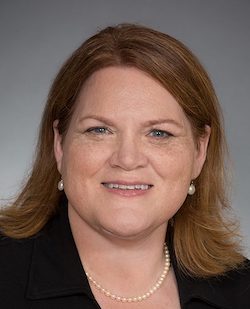
Hilaire Thompson, PhD, RN, ARNP
Joanne Montgomery Endowed Professor
University of Washington
Core faculty
Harborview Injury Prevention and Research Center
Hilaire Thompson, PhD, RN, ARNP is the Joanne Montgomery Endowed Professor in Biobehavioral Nursing and Health Informatics at the University of Washington and core faculty at the Harborview Injury Prevention and Research Center in Seattle, WA. Thompson's research examines trajectories of recovery following serious injury as well as barriers and facilitators. The goal of this work is the development of patient- and system-level interventions to improve health and wellbeing following injury.
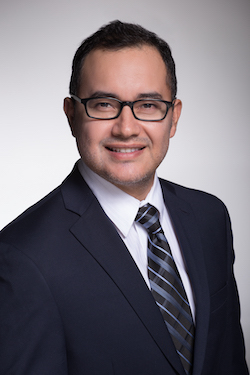
Christian Salazar, PhD
Epidemiologist
Associate Project Scientist
University of California, Irvine
Christian Salazar, PhD is an Epidemiologist and Associate Project Scientist at UC Irvine Institute for Memory Impairment and Neurological Disorders (UCI MIND). He is centrally interested in understanding the social production of Alzheimer’s disease and related dementias (ADRD) in Hispanics/Latinos and avenues for potential intervention. He is currently investigating strategies to engage Hispanics/Latinos in ADRD research studies, particularly randomized clinical trials.

Emily Treichler, PhD
Clinical Psychologist
VA San Diego Mental Illness Research, Education, and Clinical Center (MIRECC)
Assistant Professor
University of California, San Diego Department of Psychiatry
Emily Treichler, PhD is a licensed clinical psychologist and assistant professor at the VA San Diego Mental Illness Research, Education, and Clinical Center (MIRECC), and the University of California, San Diego Department of Psychiatry. Treichler holds a doctorate in Clinical Psychology (University of Nebraska-Lincoln, 2016). She completed her pre-doctoral internship at the University of Maryland Medical Center-VA Maryland Health Care System in the UM Serious Mental Illness track, and postdoctoral fellowships in psychosis and healthy aging at the VA San Diego MIRECC and University of California, San Diego. Treichler specializes in improving quality of life and quality of care for adults with serious mental illness through recovery-oriented and stakeholder-engaged intervention development and implementation. Her current VA Rehabilitation R&D funded CDA-2 is focused on adapting and evaluating an intervention to support Veterans with psychosis to gain knowledge, skills, comfort and confidence needed to initiate and engage in collaborative decision-making with their treatment teams.
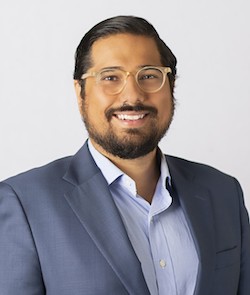
Sharad Wadhwani, MD, MPH
Pediatric Hepatologist
Assistant Professor
University of California, San Francisco
Sharad Wadhwani is a pediatric hepatologist and Assistant Professor of Pediatrics at the University of California, San Francisco. Wadhwani’s research interests are at the intersection of pediatric hepatology, population health, and health systems improvement. His work has been funded by the American Association for the Study of Liver Disease, the Starzl Network for Excellence in Pediatric Transplantation, and the NIH. He is the principal investigator of the NIH-funded, multi-center SOCIAL-Tx study that seeks to better understand how the social determinants of health, that is-where we live, learn, work, and play, impact outcomes for children undergoing liver transplant and how we can use such knowledge to improve outcomes after transplant. Father to two young children, in his spare time Wadhwani is usually playing outdoors, cooking, or listening to the “Frozen” soundtrack—again.
